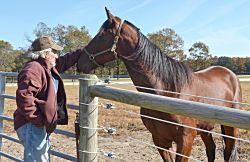‘It’s a calming feeling’
November 11, 2016,by Charlene Sharpe, USTA Web Newsroom Senior Correspondent

Charlene Sharpe
Seaford, DE — In seven years on the track, The Shepherd won 22 races and earned just under $200,000. His current owner couldn’t care less.
While indisputably a successful racehorse, these days The Shepherd is valued for the relationships he’s built with countless individuals dealing with mental and physical disabilities at 4Steps Therapeutic Riding on Maryland’s Eastern Shore. He’s one of four Standardbreds used in the program.
“These horses really leave their marks,” said Sandy Winter, director of the program. “Each one of these horses is loved by so many people. I’m just the steward.”

The Shepherd is one of four Standardbreds that reside at 4Steps Therapeutic Riding in Parsonsburg, Md.
Winter says the animals help people living with physical disabilities, at-risk children and individuals dealing with post-traumatic stress disorder (PTSD). The latter, frequently an issue for the nation’s veterans, is something horses have proven particularly helpful with.
“Being out on a horse transcends the future and the past,” Winter said. “In that moment there is no stress.”
Laura Lane-Unsworth, director of Brave HEART (Heroes Equine Adventure and Riding Therapy) in Hagerstown, Md., agrees that horses can play a huge part in helping those dealing with the effects of combat.
“They’re carrying around PTSD and they come here and find a sense of peace and inner calmness,” she said. “This magical connection happens. Horses can read us.”
Lane-Unsworth and her husband Jeff, an Iraq veteran, started Brave HEART in 2012 after realizing the important role their horses played each time he returned from a deployment. She said that in his more than 20 years in the military, it was farm life that enabled him to keep things in perspective.
“It’s that time that gets us back to normal,” she said. “We thought if we could share that with other families it’d be amazing.”
At their farm, they invite veterans and their families to enjoy the quiet rural atmosphere and experience the sense of calm that comes with working with horses. They’ve watched taciturn vets, trailing silently along with family members, engage in animated conversation once they start interacting with the animals. Lane-Unsworth remembered one recent visitor.
“We got him up on a horse and he completely came out of his shell,” she said. “The whole family was talking together and it was really heartwarming.”
Working with the massive animals, individuals have to forget their worries and fears.
“Horses aren’t going to tolerate if they’re really stressed,” Lane-Unsworth said. “It forces them to forget, at least temporarily, and focus on the horse.”
She says watching them learn to interact with the animals is like watching a light come on.
“The light had been switched off and they didn’t even realize it,” she said.

Charlene Sharpe photos
Gary Sink with Poynton Renegade at a Seaford, Del., training center.
Of course not everyone dealing with PTSD finds themselves in a therapeutic riding program. Others come to realize the healing powers of horses on their own.
Harness racing trainer Gary Sink, 71, is one of those. Sink, a paratrooper in the 101st Airborne division during the Vietnam War, has dealt with PTSD ever since. He let a friend talk him into buying a racehorse in the early 1970s but had no idea it would help with his stress. Even now, knowing how horses have helped him cope, he can’t explain it.
“They just understand some way,” he said. “I don’t know how. When they act the way they do toward you it’s a calming feeling.”
Sink says horses are able to read a person. He pointed out the way his current racehorse, 2-year-old pacing colt Poynton Renegade, tended to be aggressive toward most people but didn’t give him any trouble.
“With the post-traumatic stress and what I’ve been through, they know I don’t have any fear,” Sink said. “They can sense that.”
Winter says that in 16 years of working in the therapeutic riding field, she’s amazed at the ways she’s seen horses restore trust, inspire confidence and instill peace. Standardbreds, in particular, have proven adept at aiding those living with physical and emotional limitations.
While The Shepherd and El Diablo are two of the more recent Standardbred additions at 4Steps Therapeutic Riding, Winter considers My Mercedes (1990, p,4,1:57.1h, $15,303) and Sleepwalk (1989, p,1:53.1f, $294,112) the program’s foundation horses. She acquired her first two retired Standardbreds by chance and has made an effort to use them in her program ever since.
“The horses just took to the job,” she said. “They’re so willing to do their work it’s incredible.”
